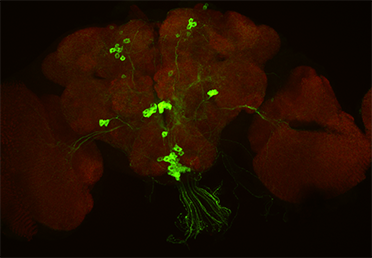What Fruit Flies Can Teach Us About Love
BY Cal State East Bay
February 15, 2021
The fruit fly, Drosophila melanogaster, is remarkably different from us. It looks different, lives a very different life and has other priorities. But when we go deeper (as scientists have), we find that the Drosophila genome is 60 percent homologous to humans, and about 75 percent of the genes responsible for human diseases have homologs in flies.
East Bay Today recently talked with Assistant Professor Divya Sitaraman about how fruit flies can help teach us about our own physiology and behavior. These answers have been edited for brevity and style.
What can we learn from fruit flies about love?
That’s a difficult one. The question that has intrigued us for a very long time is how animals engage in different behaviors. As in how do they make choices in light of competing demands? For example, very early in our research, we found that the need to sleep in flies often comes at the cost of engaging in social behaviors like courtship, critical for survival and reproduction. So in a way, they sacrifice love to fulfill another need, which is sleep.
We have learned that a good night’s sleep is necessary for flies to engage in social behaviors that may eventually lead to love. At least in flies, we can pin this behavioral interplay (sleep and courtship) down to single neuronal populations and genes. We also have a project in the lab where the flies that sleep less engage more in social behaviors, increasing their chance of mating success.
What can we learn from fruit flies about connection?
Fruit fly love involves a repertoire of behaviors that have evolved to achieve reproductive success, including following the female, tapping her to get attention, singing a courtship song. We quantify these behaviors in the lab, and it’s amazing to observe how the flies use all of their senses to court a female successfully. If some of these behaviors are not acceptable to the female fly, male flies are rejected. What we can learn about the connection is that it takes time, and sometimes it doesn’t work.
What has your research taught you, personally, about love and connection?
Research is a creative process. I have been working with flies for over 16 years, and every day in the lab brings something different. The act of planning, executing an experiment and analyzing the data is very time consuming, and most of the time, your experiments fail. So my research has taught me to be patient and resilient because it’s really rewarding when it works. Just like love, you have to give a lot and not expect much, and when things work, it’s a wonderful feeling of accomplishment.
Besides my connection to my flies, the community of students and trainees I work with in my lab has taught me a lot about love and connection. Because of Covid-19 we have only had one to two students in the lab, and I really miss the scientific discussions, the constant back and forth, and the excitement of new ideas and research directions.
Lastly, I want my lab to be a safe and sacred space where we can be ourselves, respect each other, connect and explore science together.
As a foreign-born woman scientist, I have often felt like a misfit and outsider. The only thing that has kept me going is the joy of learning and experiencing science through research and teaching. Science is for everybody and should be a way for people to connect. More people need to feel like insiders in the field of science and technology, and we need to welcome and promote new and diverse voices.

Topics
Share this story